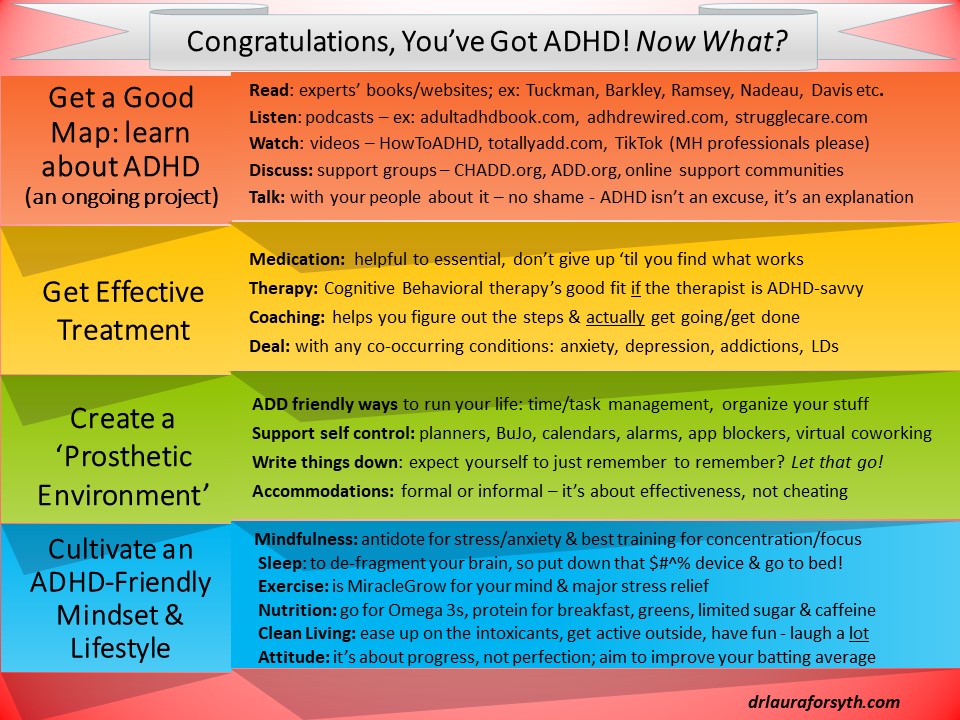It's a real condition
For many adults with ADHD, the condition may never have been previously identified; people may be frustrated by years of struggle with depression, anxiety or other problems, and treatment that never seemed to fully help. If Attention Deficit Disorder is present, it plays a pivotal role.
Long-standing mood, behavior and anxiety problems can get better with targeted treatment. Job performance improves, academic performance at university or college picks up, anger management and irritability problems lessen, worries lighten up. Even the grip of addictive or compulsive behavior can be loosened, once the underlying ADHD is addressed and treated.
Some people, especially college students or other young adults, may have been diagnosed as kids with ADD/ADHD and even have been treated with medication, but stopped treatment because it was uncomfortable or they wanted to try things on their own. Then, as time passed, they noticed that something, somehow, always seemed to be getting in the way of getting things done, progressing towards goals or just finding direction in life. If that's your situation, welcome back! Things have gotten much better and more interesting in ADHD-land in recent years. We know a lot more and can do a lot more. It's a big club with a lot of great people in it.
Treatment starts first with an assessment of your situation and needs. Not all problems with inconsistent attention, mood swings or emotional over-reactions, impulsiveness and hyperactivity are due to AD/HD. I can help you to clearly understand the nature of your difficulties and get a practical understanding of how ADHD and other conditions interfere with your day-to-day life (functional impairments). From there, we can identify effective accommodations and targeted coping strategies, which includes figuring out how to implement them on a day-to-day basis. Counseling supports your growth and a better, more accurate story of you and your life.
Long-standing mood, behavior and anxiety problems can get better with targeted treatment. Job performance improves, academic performance at university or college picks up, anger management and irritability problems lessen, worries lighten up. Even the grip of addictive or compulsive behavior can be loosened, once the underlying ADHD is addressed and treated.
Some people, especially college students or other young adults, may have been diagnosed as kids with ADD/ADHD and even have been treated with medication, but stopped treatment because it was uncomfortable or they wanted to try things on their own. Then, as time passed, they noticed that something, somehow, always seemed to be getting in the way of getting things done, progressing towards goals or just finding direction in life. If that's your situation, welcome back! Things have gotten much better and more interesting in ADHD-land in recent years. We know a lot more and can do a lot more. It's a big club with a lot of great people in it.
Treatment starts first with an assessment of your situation and needs. Not all problems with inconsistent attention, mood swings or emotional over-reactions, impulsiveness and hyperactivity are due to AD/HD. I can help you to clearly understand the nature of your difficulties and get a practical understanding of how ADHD and other conditions interfere with your day-to-day life (functional impairments). From there, we can identify effective accommodations and targeted coping strategies, which includes figuring out how to implement them on a day-to-day basis. Counseling supports your growth and a better, more accurate story of you and your life.
Do I have ADHD?
If you're wondering if you, or someone you care about has ADD or ADHD, here are two options to get you started:
- For people who like things in written form, simple and clear - use the Adult ADHD Self-Report Scale (ASRS-v1.1) Symptom Checklist. Developed for use by primary care doctors, it's a good self-screener.
- If you prefer something interactive, try Do I Have ADD? from the folks at TotallyADD.com. There's loads of great info, video, discussion, humor, etc. there, too.
How to manage ADHD - the basics
Manage verb "to succeed in doing something, especially something difficult" (from the Cambridge Dictionary).
Managing ADHD is a process, not something done once, but pretty much every day. Naturally, some days go better than others. If you've just been diagnosed or have known for a while but want a refresher, check out these guidelines for managing ADHD.
Managing ADHD is a process, not something done once, but pretty much every day. Naturally, some days go better than others. If you've just been diagnosed or have known for a while but want a refresher, check out these guidelines for managing ADHD.
Interested in working with me? In-person & online counseling is available (online services for people living in CA). Contact me for a free 15 minute consultation by phone or secure video.
Image courtesy of PlusLexia.com
